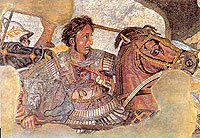Alexander the Great
 In the spring of 329 BC, the heavily armed Greek-Macedonian army led by Alexander accomplished in fifteen days a difficult passage from Northern India across the eternally snow-covered Hindu Kush, and invaded the territory of Central Asia.
In the spring of 329 BC, the heavily armed Greek-Macedonian army led by Alexander accomplished in fifteen days a difficult passage from Northern India across the eternally snow-covered Hindu Kush, and invaded the territory of Central Asia.
Having crossed the Amu-Darya, the Greeks moved towards Marakanda, and after a fierce fight seized the town. Having left there a garrison, Alexander the Great launched another campaign to the East, towards the Fergana Valley. But the journey of the Greek conquerors proved to be not an easy one. The freedom loving Sogdians put up strong resistance. Defending their independence, the population fought to the last man. The bitter struggle went on in Sogdiana for three years. The center of resistance was Marakanda.
The uprising is believed to have been inspired by the illustrious hero of the Central Asian peoples Spitamen. In the spring of the year 327 BC Alexander besieged the fortress "Sogdian Crag" that was situated on the southern slopes of the Hissar mountain range. The rebels offered strong resistance. "The Rock" was impregnable, and its defenders determined to fight to the death. In reply to the offer to surrender they proudly proclaimed, "Let Alexander send winged warriors for who are able to fly up to our rock".
The highlanders' challenge hurt Alexander's pride. He announced that those of his fighters, who managed to clamber up the rock, would receive a high reward. The siege began. A group of warriors, with enormous difficulty, managed to climb up the sheer precipice and attacked the defending party from the rear. The fortress fell.
Many women and children were taken prisoner. Among the captives was the daughter of Spitamen's associate Axiart, a girl of astounding beauty, named Roxana. "Alexander caught sight of her and fell in love. He didn't desire to offend her or regard her as a prisoner and considered her worthy of the title of wife". Having married her, Alexander won over the local aristocracy to his side and thus consolidated his mastery over the Sogdians.
The heroic insurrection of the Sogdians was brutally put down. The historian Quint Curtius describes Spitamen's death as follows: "Spitamen loved his wife passionately, and took her everywhere with him, and she bitterly endured the escape and banishment. Weary of the stress, she tried to convince him to capitulate."
But he responded that he preferred death to captivity...
At a feast, having gained sight of her husband who was intoxicated and asleep, the wife took out her sword that she had hidden under her clothes and cut his head off, and, covered in his blood, she handed the head to her slave, the accomplice of the crime.
Accompanied by him, without changing her bloody clothing, she appeared in the Macedonian camp... and handed Alexander Spitamen's head".
The noble figure of the great leader of the Sogdians, who bravely struggled for the happiness of his people, went down in history covered in glory.
Alexander the Great's early death (323 BC) brought about internecine wars that led to the breakup of the empire, and to the formation of a number of separate states Around 306 BC the territories of Bactria, Sogdiana and Margiana became a part of the state of the Seleukids.

